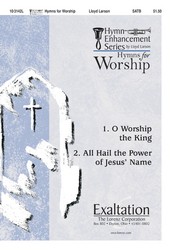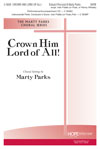- |
User Links
All Hail the Power of Jesus' Name
Hymn Information
- First Line
- All hail the power of Jesus' name!
- Author (st. 1-3)
- Edward Perronet (1780, alt.)
- Author (st. 4)
- John Rippon (1787, alt.)
- Tune Name
- CORONATION
- Composer
- Oliver Holden (1793)
- Topic
- Jesus Christ: King · Jesus Christ: Lord · Jesus Christ: Majesty · Jesus Christ: Name of · Praise of Christ · Victory · Elements of Worship: Praise and Adoration
Copyright Information
- Text Copyright
- Public Domain
- Tune Copyright
- Public Domain
- Reprint/Projection Information
- Words and Music: The Words and Music are in the Public Domain; you do not need permission to project or reprint the Words and Music.
Full Text
Scripture References
Thematically related:
- st. 1 =
- st. 2 =
- st. 3 =
- st. 4 =
Further Reflections on Scripture References
Originally headed "On the Resurrection, the Lord Is King," this fine coronation hymn affirms the kingship of Christ and calls on all creatures to "crown him Lord of all." The "power of Jesus' Name" is hailed by angels (st. 1), by converted Jews (st. 2), by all humankind (st. 3), and by ourselves (st. 4). (Rippon actually entitled each stanza "Angels," "Converted Jews," "Sinners of Every Nation," "Ourselves," etc.) The middle stanzas highlight redemption and conversion from sin as the grounds for the exuberant refrain.
Bert Polman, Psalter Hymnal Handbook
Confessions and Statements of Faith References
Further Reflections on Confessions and Statements of Faith References
The best-loved expressions of praise for God’s care-taking work of his children comes from the familiar words of Heidelberg Catechism, Lord’s Day 1, Question and Answer 1: “My only comfort in life and death [is] that I am not my own, but belong—body and soul, in life and in death—to my faithful Savior, Jesus Christ. He has fully paid for all my sins with his precious blood, and has set me free from the tyranny of the devil...Because I belong to him, Christ by his Holy Spirit, assures me of eternal life and makes we wholeheartedly willing and ready from now on to live for him.”
This great truth is explained more completely by Belgic Confession, Article 20. God has given his Son to die for us “…by a most perfect love, and raising him to life for our justification, in order that by him, we might have immortality and eternal life.” And in Article 21, “…He endured all this for the forgiveness of our sins.” For this redemptive work we give praise and adoration.
All Hail the Power of Jesus' Name
Words of Praise
Assurance
All Hail the Power of Jesus' Name
Tune Information
- Name
- CORONATION
- Key
- G Major
- Meter
- 8.6.8.6.8.6


 My Starred Hymns
My Starred Hymns






